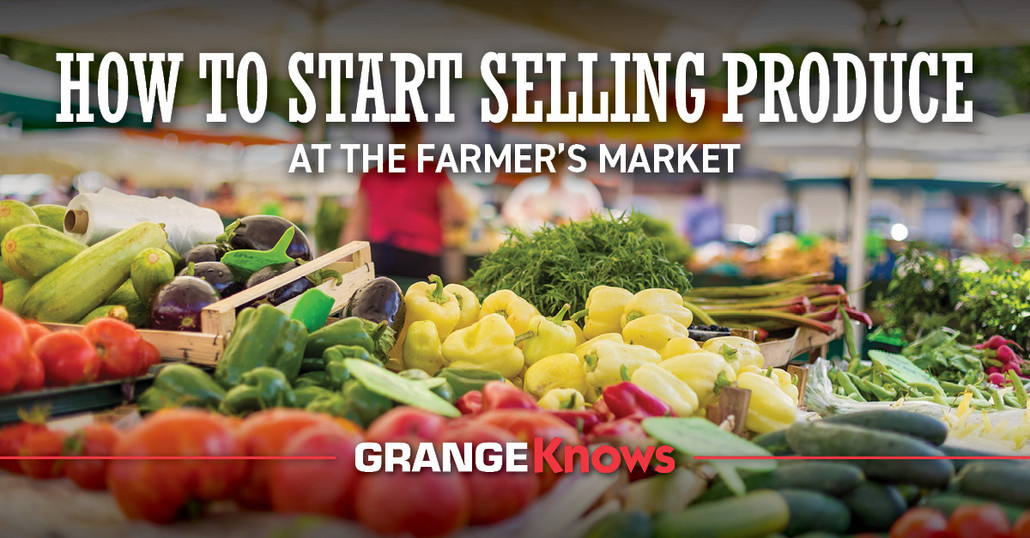
How to Start Selling Produce at the Farmers Market
Posted by Grange Co-op on 14th Feb 2023
Getting Started
There’s more to setting up a booth and bringing the products that you want to sell. Each state and locality have its own rules and regulations. In California, you will need to file an application with the California Farmers’ Markets Association (CFMA). The CFMA website also offers a lot of information about what you can sell and can’t at CFMA-certified farmers markets.
In Oregon, vendors can sell certain products without a license. At the state level, you won’t need a license or permit to start vending. However, you will also need to find out the rules and regulations of the county or area before you take the next step.
Planning What to Sell
Maybe you’ve already got an idea about what you want to sell. You might want to double up on your vegetable garden, or you have chickens that lay farm fresh eggs. Whatever you decide to sell, it should be something in demand that will interest a lot of buyers, including:
Fruits and Vegetables
Fresh produce is one of the most popular items sold at farmers markets. People love buying homegrown products that are harvested when they are ripe and full of nutrition and flavor. If you decide to sell the extras from your garden or increase your crop, you can choose the level of work you want to put into it.
Regardless of the volume of produce you sell, do everything possible to grow healthy plants. Use organic pesticides whenever possible.
Pies, Jellies, and Jams
Some markets allow you to make and sell baked goods. Instead of selling fresh fruit, you might prefer to make desserts. You will attract lots of buyers who can’t match your level of cooking expertise. Honey is another sweet treat that will do well. If you keep bees, the market is always in demand for honey and other related products. For example, you might make some beeswax candles.
Crafts
Can you crochet, knit, carve wood, or make custom jewelry? Put your talent to work and get top dollar for your one-of-a-kind products.
Plants and Flowers
Plants and flowers are popular items at farmers markets too. You can either grow your own or buy and resell them at a profit. Shoppers may buy out of convenience rather than make a trip to the nursery. In a rural area, you can start growing seeds that are ready to plant in the garden at just the right time.
Create a Business Plan
Farming as a business means starting with a business plan. That includes mapping out what you’re going to sell and what your startup costs and potential profit will be. Will you sell produce part-time at the Sunday farmers market or turn it into a full-time source of income? Once you get everything down on paper, you can look for errors in your strategy and make any adjustments as needed.
One of the most important considerations is how much money you can put into your new business venture. Add up the cost of fees and licenses, booth rental, paid help, product containers, storage tables or shelving, and any promotional items like signs. Determine your budget and make any changes needed to meet it.
Consider Promotional Items
Think up a name for your business and use it in your signage. Try to come up with an eye-catching design that makes your booth stand out. If it’s within your budget, consider handing out promotional items like pens or pencils.
Consider How You Will Manage Payments
Offering credit and debit card payments will increase your sales. All you need is a bank account and a mobile card reader. On the flip side, you will probably pay a fee for each sale, reducing your profit by some degree. Decide whether it’s to your advantage to accept credit card payments or just take cash.
You will need a secure cashbox for the money you do take in. You will need to come equipped with enough small bills to give your customers change.
Grange Co-op Has What You Need for Healthier Produce
Grange Co-op has a variety of gardening products to keep out weeds and help plants grow stronger. Trellis netting will protect your climbing fruits and vegetables and aid in cultivation. If you need a new tiller to get you started, our range extends from small handheld models to Troy-Bilt rear tine tillers for gardens of every size.
Have questions about our products? Just contact us with our online contact form. We’re always happy to help!
